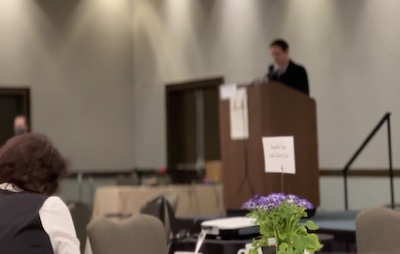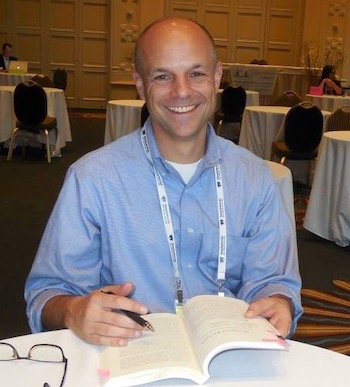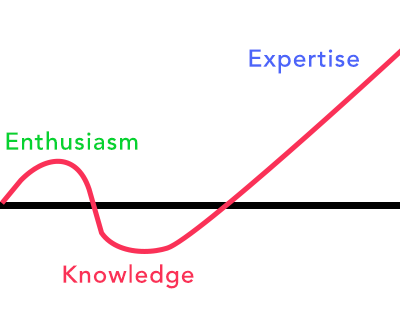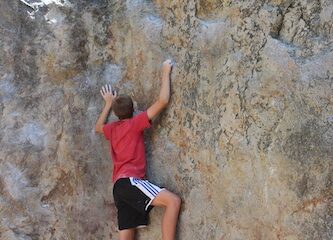You’ve taken the courageous first steps to fulfilling (or killing) a dream… now what? How to survive the J Curve.
“You’re already way ahead of so many other people,” the literary agent encouraged 300 writers at the end of this weekend’s Writers Conference. “You’re here. You’re learning. You’re investing in your career.”
Lots of heads nodded agreement… most of the attendees felt energized and validated by her words.
Some, I knew, were feeling overwhelmed and discouraged.
They had all arrived three days earlier with their own version of a dream of being a published author. The conference flooded them with information, new options, complicated advice, and the cold water of how difficult and unforgiving the publishing process is.

Intentionally blurred, clipped from a video.
A dream dies the day you begin to pursue it
The wonderful thing about dreams is that you can hold on to them forever… if you never actually pursue them.
The moment you begin pursuing a dream, it dies. Or, rather, it morphs—it moves out of your fantasy world and into the real world.
In daydreams and fantasyland, you can ignore the inconvenient truths of the real world. You’re free to jump straight to the ideal destination—accepting your Oscar, or signing books as a New York Times best-seller, or ringing the bell at the NYSE for your IPO—without having to consider all the grind, rejection, competition, and resilience it might take to get there.
You may even semi-pursue the dream as a hobby. You may join a writing group or take piano lessons. You may write business plans and design gadgets or write code late at night.
For many people, keeping that dream in the hobby realm is comfortable their whole lives.
For others, though, there’s a moment when something inside shifts. The point when you know you need to take action or give up. Pursue the dream, or let it go.
That’s how I felt a decade ago when I nearly quit writing altogether.

For the first-time attendees at the Writers Conference, they had felt this shift. They paid the fee, traveled to San Francisco, dedicated four full days of their lives to the craft of writing and and the business of publishing.
They had taken that courageous step of putting their dream at risk by testing how it would feel in reality.
“You’re already way ahead of so many other people.”
The agent wasn’t wrong, but the truth is that some people in the audience will forge ahead into this new work with relentless enthusiasm, while many will shove it back into their fantasy world and keep playing at it as an enjoyable hobby. A few may even go home and quit outright now that they know what reality looks like.
All three are valid and legitimate reactions that should be celebrated… if the person is making that choice for the right reasons.
This can be a confusing and disorienting time
When you take that courageous step to put your dream at risk by actually pursuing it—especially in midlife when you may be leaving another career—you are likely to feel a number of things at the beginning of the journey.
Excitement and enthusiasm will run through your blood all day and all night. You’ll find your thoughts drifting to this new pursuit in both quiet and busy moments. When you’re doing something else, you’ll feel resentment that it’s keeping you from implementing all the new things you’ve learned.
Self-doubt will battle determination. You’ve just been shown how hard it will be to make your dream real, but you’ve also seen it can be done. Are you able to grind it out? Do you have enough grit and resilience to face the setbacks, rejections, closed doors, and other barriers?
And of course fear. Fear was part of what kept you back until now. Fear of failure. Fear of success. Fear of embarrassment. Fear of losing your investment of time, money, and the goodwill of your family and friends. Fear of letting others down. Fear of change.
But mostly what you’re feeling is exhilaration. At least initially.
The J Curve: how the process of learning affects your self-awareness
There’s this phenomenon known as the J Curve, which essentially shows that when you invest in something new, there will be a period at the beginning in which returns are negative. After a while, the investment begins to show positive returns until you reach a state that’s neutral compared to your original investment. Then the returns continue to grow.
This concept has also been applied to personal growth, but with a twist.
When you start to learn something new, there’s a period where you feel like you’re really growing. And you are. The thing that was a mystery before suddenly becomes demystified. You’re not an expert yet, but you’re suddenly aware of so much that you hadn’t known before.

During this period of enthusiasm, you feel like you’re really good at this thing you’ve started, and you are certain you’re going to take over the world in short order.
When you’ve learned a certain amount, however, you also become keenly aware of how much you still don’t know.
Before you started, you knew little or nothing. As you learn, you’re gaining knowledge and skills you didn’t have before. The change is noticeable.
What you’re also learning during this time is how to understand what expertise truly looks like.
For example: Perhaps you decide to become a master carpenter. You quickly learn to use various tools and a number of techniques. You build a few basic pieces, and you’re feeling pretty good about yourself. But the more you learn and build, the more completely you perceive what true expertise and artistry look like, and the more distant that seems.
This is typically true in many new pursuits.
You’ve reached a new level of self-awareness about your own skills and progress, and you’ve become aware of how much work and time it will take to make your original dream a reality.
That’s when the knowledge crash happens, and your enthusiasm and confidence plummet. You’re in the J Curve.
Why you should be worried if your enthusiasm doesn’t plummet at some point
One of my favorite bits of human nature, a truly dastardly destroyer of self-confidence, is the Dunning-Kruger Effect.
Loosely explained, it says that people who are incompetent at something tend to overestimate their own skill level. The opposite is also true: People who are very adept at something tend to undervalue their skill level.
This is because those who are incompetent at something not only lack the skills to do that thing, but they lack the tools with which to discern between expertise and mediocrity.
If you dive into something new and you feel like you’re outstanding at it from the start and just keep getting better, you may actually not be any good at it at all.
But if you dive into something new and feel like you’re really rocking it at first, then begin to see how inexpert and novice your work seems compared to the masters, then…
Congratulations! You suck at it, but you are able to understand that you suck at it.
Which means you can keep working at getting better until you don’t suck at it anymore, and hopefully keep growing until you actually do reach that dream.
How to push through the J Curve and realize your dreams
Or not.
I’ve seen people get to the bottom of the J Curve and realize that their original dream isn’t worth all the work and sacrifice it will take to get there… if it’s possible at all. I’ve made this decision from time to time in my life—time for a new dream.
I’ve seen people get to the bottom of the J Curve and redouble their effort now that they can see the path to success. Some get there. Some don’t. Skill, persistence, resilience, and even dumb luck will all have a say in the outcome. That’s just how it goes in life.
And I’ve seen people who never experience the J Curve but who keep plugging away expecting success yet completely unable to figure out why they can never achieve it. These people tend to blame everything but their own level of competence. I hope I’ve never been this person, but since I’m a human being, I figure I must have at some point.
Now what?
If you’ve just gotten home from the Writers Conference, take a minute to breathe. Absorb and contemplate all the things you learned. Value the contacts you made and follow up as appropriate.
And read my flyer that you got in your conference bag. Take me up on the offer of free coaching.
I’d love to hear about the dream that you brought into the conference, and how you’ve changed over the weekend. I’d love to talk through what excites you and what you’re worried about. And I’d love to help you find the right path for you going forward.
If you didn’t go to the writer’s conference but you have some kind of dream, get in touch with me. I’d love to talk with you about the same things.
Videos from the conference
As a bonus to this post, here are three videos I made while I was there. The last one includes my poetry reading from the open mic after the Saturday night gala. It’s a poem that was inspired by a photo taken by my partner, and which will appear in the collection I’m publishing this summer. A future blog post will detail how you can pre-order it to get your copy on June 5th. In the meantime, you can enjoy a dozen of these pairings in our 2023 calendar.



0 Comments